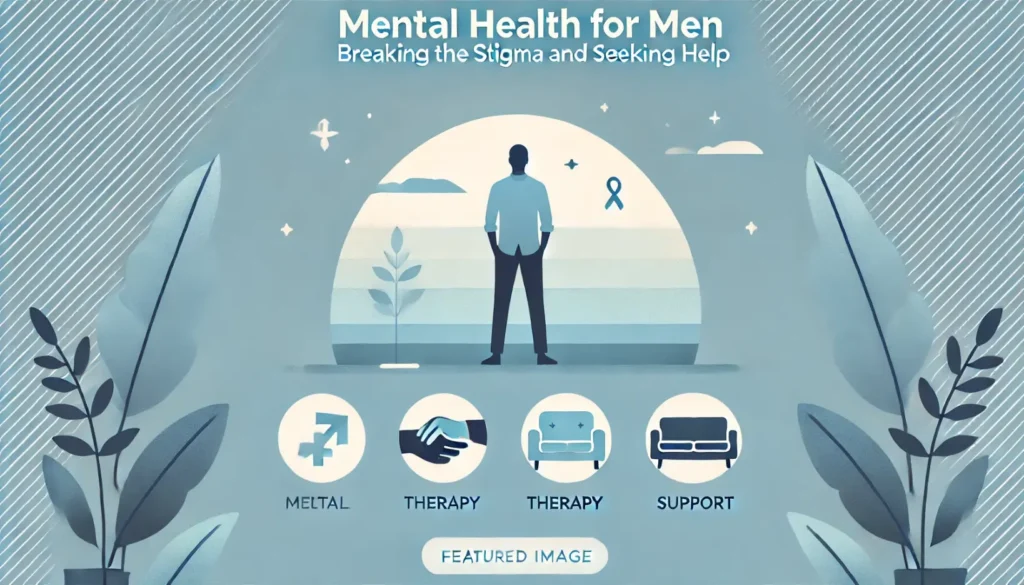Mental Health for Men: Interest in men’s mental health has increased dramatically in recent years due to a variety of factors.
Mental health is a crucial aspect of overall well-being, yet it often remains a stigmatized topic, especially among men. The stigma surrounding men’s mental health can significantly hinder their willingness to seek help, leading to untreated issues that can affect every facet of their lives. [1]
This article explores common mental health issues among men, the importance of seeking help , and strategies for improving mental well-being.

Causes Of Not So Good Mental Health For Men
Interest in men’s mental health are growing significantly due to many factors:
- Higher Incidence and Prevalence: Studies in psychiatric epidemiology consistently indicate that men experience a significantly higher number of mental health problems than women. [2]
- Socioeconomic Changes: Social science research suggests that socioeconomic changes are leading to the marginalization of certain subgroups of men. [3] [4]
- Advocacy and Attention: Activists and scholars from various fields, including criminology, education, and psychology, have successfully pushed for more attention to men’s and boys’ issues and well-being. [5] [6]
Importance of Mental Health for Men
Understanding Mental Health
Mental health encompasses our emotional, psychological, and social well-being. It influences how we think, feel, and act, affecting everything from stress management to relationships and decision-making.
Poor mental health can lead to physical health problems, strained relationships, and decreased productivity. [7]
Common Mental Health Issues Of Men
Common mental health issues among men include depression, anxiety, and stress. Men are often less likely to report these conditions or seek help due to societal expectations. [9] [10] [11] [12]
Studies show that depression and anxiety are prevalent among men, with significant impacts on their quality of life. [13]
Don’t Miss Checking Out This Blog: Simple Ways To Improve Digestive System
Breaking the Stigma
Societal Expectations
Societal expectations and traditional views of masculinity contribute to the stigma around men’s mental health. These expectations often discourage men from expressing their emotions or seeking help. Men may engage in risky behaviors or avoid emotional expression to conform to these societal norms. [14]
Personal Stories
Public figures who have openly discussed their mental health struggles have helped reduce stigma and encourage others to seek help. These stories highlight the importance of vulnerability and seeking support. [15]
Seeking Help and Support
Recognizing the Need for Help
Recognizing the signs of mental health issues is the first step toward seeking help. Common symptoms include persistent sadness, anxiety, irritability, and changes in sleep or appetite. [16]
Professional Support
Seeking help from mental health professionals such as therapists, counselors, or psychiatrists is essential. [17]
Support Networks
Building a support network of friends, family, and peer groups is vital. These networks provide emotional support and practical advice for managing mental health issues. [18]
Strategies for Improving Mental Well-Being
Healthy Lifestyle Choices
A healthy diet, regular exercise, and adequate sleep are crucial for maintaining mental health. Adding these habits into daily life can improve mood and reduce stress levels. Nutrient-rich foods, physical activity, and good sleep hygiene play significant roles in mental well-being. [18]
Stress Management Techniques
Effective stress management techniques include mindfulness, meditation, and deep breathing exercises. Taking regular breaks and engaging in hobbies or activities that bring joy and relaxation can also help manage stress. [19]
Developing Resilience
Building resilience helps men cope with stress and adversity. Activities that promote resilience include setting realistic goals, practicing gratitude, and maintaining a positive outlook. These strategies enable men to recover from setbacks and continue moving forward. [20]
Summary
Breaking the stigma around men’s mental health is crucial for encouraging help-seeking behavior and improving overall well-being.
By recognizing the importance of mental health, seeking professional support, and adopting healthy lifestyle habits, men can effectively manage their mental health.
Take proactive steps today to improve mental well-being and reach out for support when needed.

